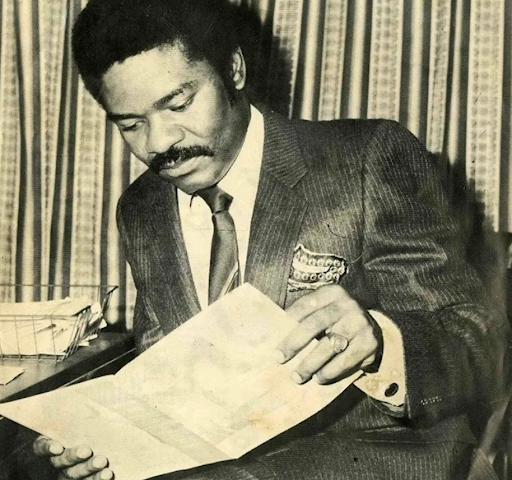
Like many of his colleagues, Alex Ogbu, a freelance journalist, was on an assignment covering protesting members of the Islamic Movement of Nigeria (IMN), commonly known as Shiite sect, in Abuja, North-central Nigeria, when he was shot dead on Jan. 21, 2020.
The day was one of many instances where security operatives fired live bullets at protesters demanding the release of their leader, Ibrahim El-Zakzaky, who had been in detention since December 2015.
As soon as the protest began, the Police arrived. They started shooting sporadically to disperse the protesters. Ogbu was unlucky, got shot in the head, and that was the end of the 50-year-old man’s career as a journalist.

Soon, his wife, Francisca, got a call from the Police Station in Utako, an urban district in Abuja, that her husband had “little issue.” All she could think of was the possibility that her spouse had been arrested but the story changed when she got to the police station.
“Although the police claimed he fell and died, during my first visit to the morgue, I saw a bullet wound and how it pierced his head,” Francisca told HumAngle.
Before his death, Ogbu had worked with African Herald, Regent African Times, New Nigeria, and other media platforms.
“My husband died when our daughter was a year and half old. Life has since been hard because I was not working during his lifetime. Our daughter is now in Nursery One but does not know how her father looked. Sadly, I am still owing last year’s school fees.”
Francisca told HumAngle that her friends and family have since 2020 been supporting her with stipends to raise her daughter. Also, her efforts to get justice have proved abortive two years after.
“The Police keep saying they are investigating, and we’ve heard nothing. My husband was killed for doing his job,” she said bitterly.
The sad trend
Ogbu was neither the first nor the last Nigerian journalist to be a victim of impunity. HumAngle reported that no fewer than ten journalists had been murdered with impunity in the past four years.
According to the 2021 World Press Freedom Index compiled by Reporters Without Borders (RSF), Nigeria ranked 120 of the 180 countries where journalism is difficult to practice.
“Nigeria is now one of West Africa’s most dangerous and difficult countries for journalists, who are often spied on, attacked, arbitrarily arrested or even killed.”
Pelumi Onifade, a 20-year-old journalist with Gboah TV, an online broadcast platform in Lagos, Southwest Nigeria, had his last reporting assignment on Oct. 24, 2020. He was assigned to cover the looting of food warehouses where the government had stored COVID-19 relief supplies during the #EndSARS protest.

The Police deployed to clamp down on the mob shot sporadically at the scene. Onifade was shot in the back and was taken away. The youngster was declared missing by family members until his corpse was found in a morgue on Oct. 30, 2020.
As of the time this report was filed, no one has been arrested for the killing. His corpse is still at the Lagos State University Teaching Hospital, a state-run hospital that conducted autopsy on some 96 persons in the wake of the protests in 2020.
Also, two years after Precious Owolabi, an intern with Channels TV was killed during a Shiite protest in Abuja, justice remains uncertain.
Owolabi, 23, died on July 22, 2019 after sustaining a gunshot injury in his abdomen. He was first taken to a private hospital in the capital city where he was rejected. Sadly, he died when he was being taken to National Hospital Abuja.
Though the killers of Owolabi are yet to be identified, his father, Ayo said he has forgiven the perpetrators, having understood that there is no solution to bring his son back alive.
Unresolved killings
There is a long history of press attacks and unresolved killings of journalists in Nigeria. From the military era to the current democracy, the story remains the same.
Unfortunately, the perpetrators have been emboldened by the authorities that fail to take proactive steps toward resolving the killings. Many have argued that lack of accountability is causing more harm than good to media practitioners.
One of the country’s foremost investigative journalist, Dele Giwa, was assassinated through a parcel bomb way back in Oct. 19, 1986.

The military government at the time was alleged to have been in the know of his death, but nearly 36 years later, no one has been arrested or prosecuted in connection with the killing.
In Nigeria, journalists report for a living and for holding those in power accountable, but in many instances, they get squashed in search of truth.
Support Our Journalism
There are millions of ordinary people affected by conflict in Africa whose stories are missing in the mainstream media. HumAngle is determined to tell those challenging and under-reported stories, hoping that the people impacted by these conflicts will find the safety and security they deserve.
To ensure that we continue to provide public service coverage, we have a small favour to ask you. We want you to be part of our journalistic endeavour by contributing a token to us.
Your donation will further promote a robust, free, and independent media.
Donate HereStay Closer To The Stories That Matter




